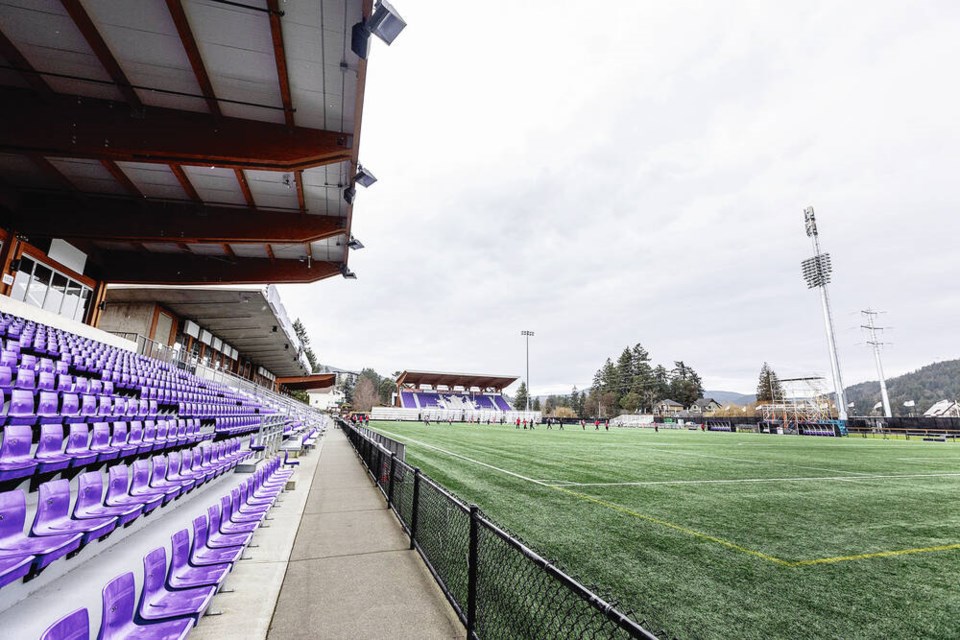Pacific FC is not for sale.
“The rumour is not true. It was a silly rumour and we have squashed it,” said co-owner Rob Friend, of the speculation that swirled this month.
It’s all part of the whirlwind ride of Canadian soccer since being named co-host of the 2026 World Cup with the stipulation that it needed to end its status as the only developed nation in the world without a domestic pro league.
What transpired since, in many ways, has been typically Canadian — build something up only to have people run it down.
“Soccer people in this country have screamed for years of the need for a national pro league,” said Friend.
“Then right from the start there was negativity around it.”
Friend, from Kelowna, and Victoria’s Josh Simpson, both former Bundesliga pros capped multiple times for Canada, co-own PFC and Vancouver FC of the Canadian Premier League along with Lower Mainland businessman Dean Shillington.
Much of the controversy around the CPL, which just started its sixth season this past weekend, surrounds the separate entity known as Canadian Soccer Business, which is owned by the CPL owners. CSB signed a 10-year deal, with another 10-year-option, in 2018 with Canada Soccer for broadcast and sponsorship rights that reportedly pay Canada Soccer $4 million a year escalating to $5 million by 2026.
It was a bonanza deal in 2018, considering the then relatively minor stature of Canadian soccer world-wide, and anybody would have jumped on it at that moment to help fund the CPL and the national teams. Nobody could have predicted then the men’s World Cup qualification for Qatar 2022 and the women’s gold medal in 2021 in the delayed Tokyo Olympics that enhanced the perceived marketing value of both national sides, leaving national-team players unhappy with being tied to the financials from the 2018 CSB deal.
But harken back to a news conference at Starlight Stadium in 2020 to announce a men’s game between Canada and Trinidad and Tobago in Langford (eventually cancelled due to the pandemic). Everybody thought then-Canadian head coach John Herdman was there to talk about the start of the road to 2026. There was audible snickering in the room when Herdman surprised everybody and instead mentioned qualifying for Qatar 2022. While everybody else was doubting that ambition, Friend said the nascent CSB deal was there at that moment to help out the national side when nobody thought qualification for the 2022 World Cup was even remotely feasible.
People forget that because things changed as Herdman proved prescient with the rapid rise of the Canadian team to Qatar 2022 that seemed unimaginable that day at Starlight
“We made that early investment in the national team. The CSB was a huge risk and massive undertaking but it has produced opportunity, said Friend.
“We need investment in Canadian soccer like CSB. It is the catalyst to growth in this country. There have been a lot of misinformed people talking about it and we have not had the opportunity to defend it.”
The CPL is a big part of that overall package. The transition from local, amateur regional leagues to a proper Canadian soccer pyramid like other nations have (including the now two-thirds CSB-owned League1’s) has been painful to some in Canadian soccer who simply can’t accept the change. Many believe the CPL is a required prop to 2026 and will be gone after that.
One thing is for sure, starting from scratch is not cheap. The Canadian Press reported: “In December, [CPL commissioner Mark Noonan] said CPL owners were ‘probably $125 million in the hole’ from developing ‘an ecosystem for soccer in Canada that didn’t exist.’ ”
That is a staggering figure and likely can’t be sustainable in an eight-team league.
“We did not make this investment to disappear,” said Friend, after PFC’s CPL season opener over the weekend at Starlight Stadium.
“It’s like MLS was in the early days. Now MLS clubs are worth billions of dollars. This is a long-term plan. Our league has never been healthier and is studying expansion strategies and new markets. It’s like any business. That [$125 million] represents a lot of investment that has laid this foundation, where none existed before.”



